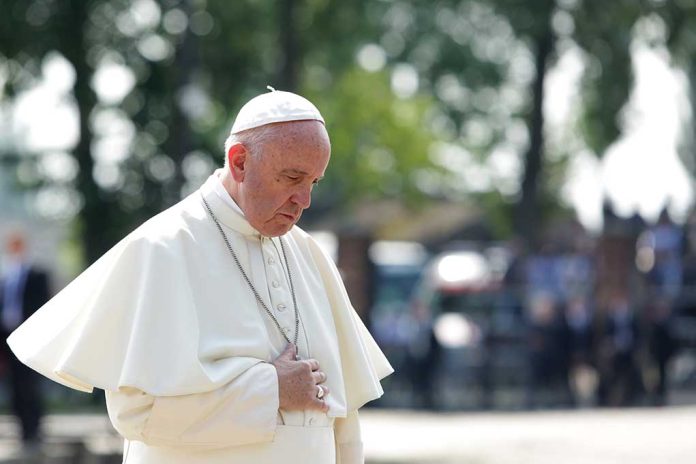
Pope Leo XIV’s appointment of Msgr. Renzo Pegoraro to lead the Pontifical Academy for Life has deepened concerns about the Vatican’s commitment to traditional Catholic pro-life teaching, as the new president previously suggested contraception might be permissible in certain situations and assisted suicide could be “the lesser of two evils.”
Key Takeaways
- Pope Leo XIV has appointed Msgr. Renzo Pegoraro, a close collaborator of controversial Archbishop Vincenzo Paglia, as the new president of the Pontifical Academy for Life.
- Pegoraro has made statements suggesting contraception might be permissible in certain medical situations and that assisted suicide could be less problematic than euthanasia.
- The Pontifical Academy for Life, established by Pope John Paul II in 1994 to defend human life, has undergone significant changes including removing the pro-life pledge requirement for members.
- Critics fear Pegoraro will continue the controversial direction set by his predecessor rather than restore the Academy’s original mission.
- Pegoraro’s appointment raises serious questions about the future alignment of these critical Vatican institutions with traditional Catholic teaching on life issues.
Controversial Leadership Change Raises Concerns
Pope Leo XIV recently appointed Monsignor Renzo Pegoraro as the new president of the Pontifical Academy for Life, replacing Archbishop Vincenzo Paglia. Pegoraro, who previously served as the Academy’s chancellor since 2011, brings credentials as an Italian priest, bioethicist, and physician. Despite his impressive background in moral theology and bioethics, his appointment has sparked significant concern among traditional Catholics who worry about the direction of this critical Vatican institution.
The Pontifical Academy for Life was established in 1994 by Pope John Paul II with the specific mission to promote and defend human life and dignity. Under Paglia’s leadership, however, the Academy underwent dramatic changes that many conservatives viewed as undermining its founding purpose. These changes included removing the requirement that members take a pro-life pledge, appointing members who publicly support abortion rights, and issuing statements that appeared to contradict traditional Catholic teaching on contraception and end-of-life issues.
Concerning Statements on Life Issues
What particularly troubles many Catholics are Pegoraro’s previous statements on contraception and assisted suicide. In 2022, Pegoraro suggested that contraception might be permissible in certain medical situations, specifically “in the case of a conflict between the need to avoid pregnancy for medical reasons and the preservation of a couple’s sex life.” This position appears to conflict with longstanding Catholic teaching against artificial contraception.
“The letter of the law can change, but not to invalidate it but rather to deepen its meaning and promote the values at stake. The rule against contraception signals values that must be preserved in married life—in particular the sense of sexuality and the transmission of life—but it is also true that other values worth protecting may be present in the situation that the family is experiencing,” said Msgr. Renzo Pegoraro.
Even more concerning were Pegoraro’s comments on assisted suicide. While acknowledging the Church’s condemnation of both assisted suicide and euthanasia, he suggested that assisted suicide might be “the lesser of two evils” in comparison to euthanasia. He stated that assisted suicide “would be accompanied by four strict conditions,” including the person being conscious and able to express their wishes freely. Such comments have raised serious questions about his commitment to upholding Catholic teaching on the sanctity of life from conception to natural death.
The Shadow of Paglia’s Controversial Tenure
Pegoraro’s appointment comes in the wake of Archbishop Paglia’s removal from both the Pontifical Academy for Life and the John Paul II Institute for Marriage and the Family. Paglia’s tenure was marked by numerous scandals, including commissioning a homoerotic mural for his cathedral that depicted him in the artwork. He also oversaw the dismantling and restructuring of the John Paul II Institute, removing faculty members who defended traditional Catholic teaching on marriage and sexuality.
“Working with him was humanly and professionally fantastic. There was no detail that was done freely, at random. Everything was analyzed. Everything was discussed. They never allowed me to work on my own,” said Ricardo Cinalli.
Critics note that Pegoraro, as chancellor during Paglia’s tenure, was involved in these controversial changes and apparently did not object to them. This has led many to fear that his presidency will simply continue the same problematic direction rather than restore the Academy to its original purpose. In his initial statements after his appointment, Pegoraro indicated he plans to continue “the operational and thematic guidelines of the late Pope Francis,” focusing on “Global Bioethics, dialogue with scientific disciplines… artificial intelligence and biotechnologies.”
The Future of Catholic Pro-Life Witness
For faithful Catholics, the question now is whether the Pontifical Academy for Life will return to its roots as a staunch defender of life from conception to natural death or continue on a path that appears to compromise with secular values. Pegoraro’s scientific credentials and experience in bioethics are well-regarded, particularly in European medical and bioethical circles, but his apparent willingness to consider exceptions to Catholic moral teaching has many concerned about the Academy’s future direction.
“I particularly highlight the themes of Global Bioethics, dialogue with scientific disciplines through the transdisciplinary approach promoted by Pope Francis, artificial intelligence and biotechnologies, and the promotion of respect for and the dignity of human life in all its stages,” said Monsignor Renzo Pegoraro.
The Pontifical Academy for Life and the John Paul II Institute were established to be beacons of Catholic teaching on life, marriage, and family in a world increasingly hostile to those values. Their future now hinges on whether leadership will prioritize fidelity to Church teaching or continue the troubling trend of accommodation to secular values. For many traditional Catholics, the appointment of Pegoraro represents a missed opportunity for Pope Leo XIV to make a clean break with the controversial policies of recent years and restore these institutions to their original mission of uncompromising defense of human life and dignity.










